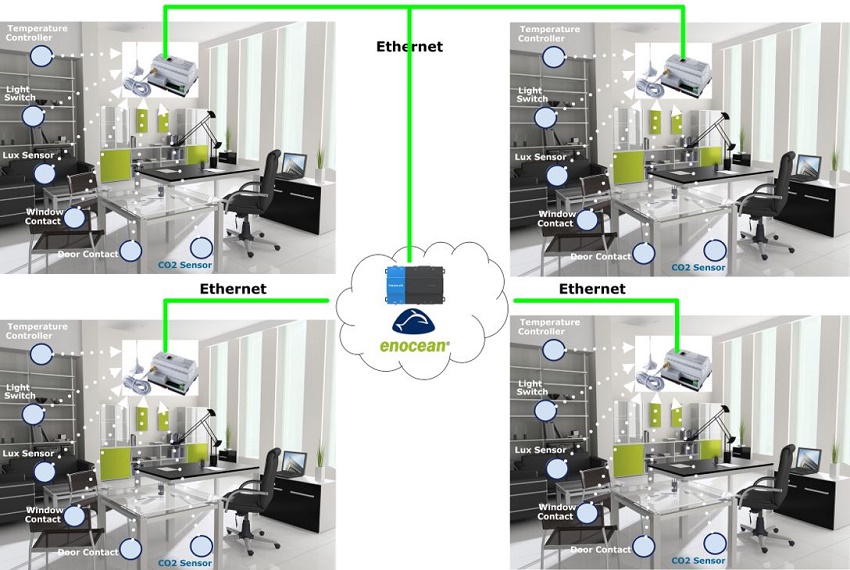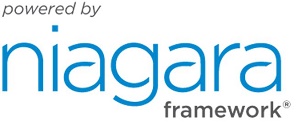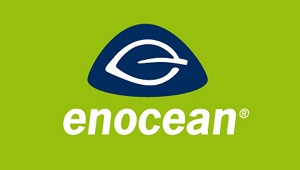|
August 2019
AutomatedBuildings.com
|
[an error occurred while processing this directive]
(Click
Message to Learn More)
|
|
Can your
"Smart IoT" building achieve JLL's latest 3:30:300:3000 rule?
How native Tridium Niagara
Framework® EnOcean® wireless energy harvesting products and solutions
empower Niagara channel partners to deliver on the 3:30:300:3000 rule
supporting Workplace strategies in Smart IoT connected buildings.
|
 Mike Welch Mike Welch
Founder ELITE-iot
Originally Published
LinkedIn
https://www.linkedin.com/in/mikejwelch/
|
Jones Lang LaSalle
(JLL),
is a commercial real estate services firm, the second-largest company
of its kind in the world. According to JLL, whose numeric rule is
quoted above, the most valuable pieces of information to learn from
buildings' controls systems and associated sensors are those who
provide definitive real-time data on space usage and user experience.
This is represented by the addition of the “3000” to JLL’s now very
familiar and globally referenced 3:30:300 rule, representing "cost
of energy:cost of space:cost of employee" per unit area of floor
space.
The
“3000” figure relates to the unexpected benefits of highly
interconnected building systems and their devices and sensors in
delivering device level value data that can be turned into incredibly
valuable real-time business operations data. This is a combination of
space utilisation information plus productivity data set against a
given set of environmental conditions, heat, quality of light, air
quality, ease of space control and use, furnishing, social interaction
and more.
Analysing
this value data enables the calculation, in real-time, of the exact
costs of a unit of space relative to the business output of that space.
Referencing
JLL’s updated rule, if you invest in improving energy efficiency by,
for example, 30% you might save the business 1 $/£/€ per unit of space
area. However, if you invest to achieve 30% improvement in space
utilisation and user experience you save 1,000 $/£/€ for the same area
of space!
Today
very few buildings have such levels of interoperable connected building
and lighting control systems installed to allow this to happen. In
fact, so disconnected are most building and lighting control systems
that any attempt to access such device value data is either incredibly
difficult, prohibitively expensive or impossible. And, even if it might
be possible, the lack of seamless real-time access to all the necessary
device level value data would mean any attempt to evaluate such data
could lead to inappropriate and costly incorrect conclusions being
reached.
So,
how might anyone begin to address this situation with some confidence
whilst establishing progress to these highly valuable potential results?

 Check
if your chosen BMS/BAS/Lighting convergent smart IoT controls supplier
has used a solution based upon Tridium’s Niagara Framework,
the global de-facto standard convergent smart IoT technology, products
and solutions. There are 30,000+ certified Niagara System Integration
engineers worldwide employed by thousands of Systems Integration
businesses who have already deployed more than 800,000 instances of
Niagara Framework across 100,000's of commercial buildings.
Check
if your chosen BMS/BAS/Lighting convergent smart IoT controls supplier
has used a solution based upon Tridium’s Niagara Framework,
the global de-facto standard convergent smart IoT technology, products
and solutions. There are 30,000+ certified Niagara System Integration
engineers worldwide employed by thousands of Systems Integration
businesses who have already deployed more than 800,000 instances of
Niagara Framework across 100,000's of commercial buildings.
 Then begin to deploy, as time and funding allow, EnOcean IEC global standard
wireless harvesting technology, PIRs, air quality, temperature,
humidity, light level sensors and switches. Such products, when
designed to conform strictly to EnOcean Equipment Profiles
(EEP), guarantee interoperability across hundreds of multi-vendor
sources, low-cost installation, virtually maintenance-free devices and
address sustainability targets before point of delivery, through to end
of life. More than 20,000,000, EnOcean devices are currently deployed
in excess of 1,000,000 buildings, supported by almost 400 global
product and solutions providers. When used directly with Niagara
Framework, BMS/BAS EnOcean products and solutions provide seamless
access real-time device value data, thus enabling the end client and
user to benefit from space usage information and experience to benefit
from the potential savings of “3000” at potentially lower than expected
implementation costs.
Then begin to deploy, as time and funding allow, EnOcean IEC global standard
wireless harvesting technology, PIRs, air quality, temperature,
humidity, light level sensors and switches. Such products, when
designed to conform strictly to EnOcean Equipment Profiles
(EEP), guarantee interoperability across hundreds of multi-vendor
sources, low-cost installation, virtually maintenance-free devices and
address sustainability targets before point of delivery, through to end
of life. More than 20,000,000, EnOcean devices are currently deployed
in excess of 1,000,000 buildings, supported by almost 400 global
product and solutions providers. When used directly with Niagara
Framework, BMS/BAS EnOcean products and solutions provide seamless
access real-time device value data, thus enabling the end client and
user to benefit from space usage information and experience to benefit
from the potential savings of “3000” at potentially lower than expected
implementation costs.
ELITE-iot
is working as an EnOcean Alliance Ambassador, developing the EnOcean
Alliance members commercial buildings market strategy. You can contact
me directly via mikejw@elite-iot.com or phone +44 118 328 0391.”
For
more information regarding EnOcean wireless energy harvesting
technology and the members of the EnOcean Alliance, please visit www.EnOcean-alliance.org.
For
more information about Tridium's Niagara Framework technology and the
global Niagara channel partners visit www.tridium.com.
For
more information regarding Jones Lang LaSalle, please visit www.jll.com.
footer
[an error occurred while processing this directive]
[Click Banner To Learn More]
[Home Page] [The
Automator] [About] [Subscribe
] [Contact
Us]
